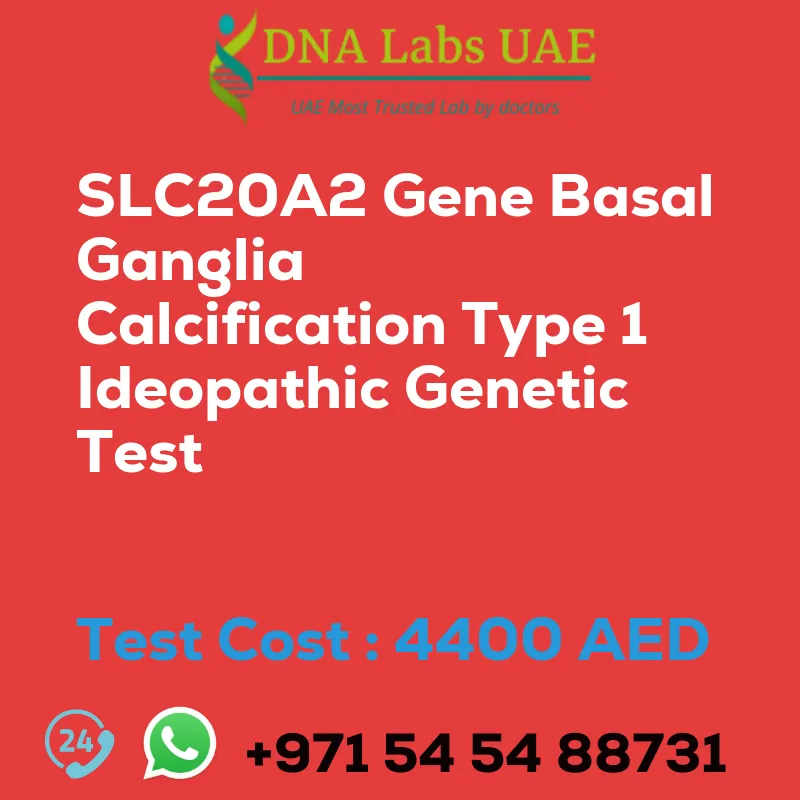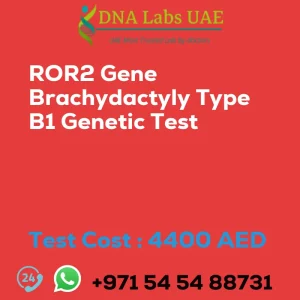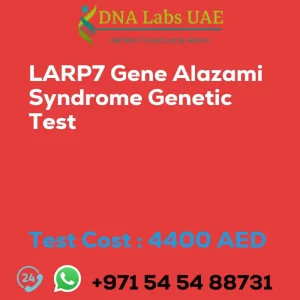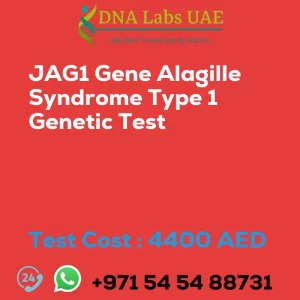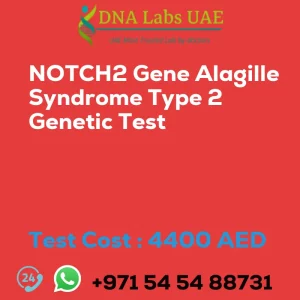SLC20A2 Gene Basal Ganglia Calcification Type 1 Ideopathic Genetic Test
At DNA Labs UAE, we offer the SLC20A2 Gene Basal Ganglia Calcification Type 1 Ideopathic Genetic Test. This test is designed to analyze the SLC20A2 gene, which is associated with a rare genetic disorder known as basal ganglia calcification type 1 or idiopathic basal ganglia calcification (IBGC).
Basal ganglia calcification is characterized by the abnormal buildup of calcium deposits in the brain, specifically in the basal ganglia region. Our NGS (Next-Generation Sequencing) technology allows for the simultaneous analysis of multiple genes, making it a powerful tool for identifying variations or mutations in the SLC20A2 gene that may be responsible for basal ganglia calcification type 1.
By analyzing the DNA sequence of the SLC20A2 gene, our NGS genetic testing can help diagnose basal ganglia calcification type 1 and provide valuable information about the specific genetic mutation causing the condition. This information can be useful for understanding the inheritance pattern of the disease, predicting the likelihood of passing it on to future generations, and potentially guiding treatment decisions.
Test Details
Test Name: SLC20A2 Gene Basal Ganglia Calcification Type 1 Ideopathic Genetic Test
Components: NGS Technology
Price: 4400.0 AED
Sample Condition: Blood or Extracted DNA or One drop Blood on FTA Card
Report Delivery: 3 to 4 Weeks
Test Type: Dysmorphology
Doctor: Pediatrics
Test Department: Genetics
Pre Test Information
Prior to undergoing the SLC20A2 Gene Basal Ganglia Calcification Type 1 Ideopathic Genetic Test, it is important to provide the clinical history of the patient. Additionally, a genetic counseling session may be conducted to draw a pedigree chart of family members affected with SLC20A2 Gene Basal Ganglia Calcification Type 1.
A genetic counselor can provide more specific information about the test, its benefits, limitations, and potential implications for individuals and their families. It is important to consult with a healthcare professional or a genetic counselor to discuss the appropriateness and availability of NGS genetic testing for basal ganglia calcification type 1.
For more information about our SLC20A2 Gene Basal Ganglia Calcification Type 1 Ideopathic Genetic Test, please contact DNA Labs UAE.
| Test Name | SLC20A2 Gene Basal ganglia calcification type 1 ideopathic Genetic Test |
|---|---|
| Components | |
| Price | 4400.0 AED |
| Sample Condition | Blood or Extracted DNA or One drop Blood on FTA Card |
| Report Delivery | 3 to 4 Weeks |
| Method | NGS Technology |
| Test type | Dysmorphology |
| Doctor | Pediatrics |
| Test Department: | Genetics |
| Pre Test Information | Clinical History of Patient who is going for SLC20A2 Gene Basal ganglia calcification type 1, ideopathic NGS Genetic DNA Test. A Genetic Counselling session to draw a pedigree chart of family members affected with SLC20A2 Gene Basal ganglia calcification type 1, ideopathic NGS Genetic DNA Test gene SLC20A2 |
| Test Details |
The SLC20A2 gene is associated with a condition called basal ganglia calcification type 1, also known as idiopathic basal ganglia calcification (IBGC). Basal ganglia calcification is a rare genetic disorder characterized by the abnormal buildup of calcium deposits in the brain, specifically in the basal ganglia region. NGS (Next-Generation Sequencing) genetic testing is a type of genetic testing that allows for the simultaneous analysis of multiple genes. It is a powerful tool that can identify variations or mutations in the SLC20A2 gene, which may be responsible for basal ganglia calcification type 1. By analyzing the DNA sequence of the SLC20A2 gene, NGS genetic testing can help diagnose basal ganglia calcification type 1 and provide valuable information about the specific genetic mutation causing the condition. This information can be useful for understanding the inheritance pattern of the disease, predicting the likelihood of passing it on to future generations, and potentially guiding treatment decisions. It is important to consult with a healthcare professional or a genetic counselor to discuss the appropriateness and availability of NGS genetic testing for basal ganglia calcification type 1. They can provide more specific information about the test, its benefits, limitations, and potential implications for individuals and their families. |

